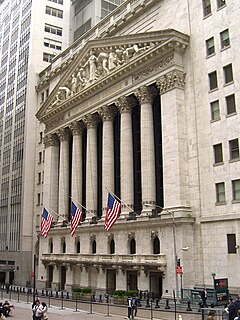
A corporation is an organization—usually a group of people or a company—authorized by the state to act as a single entity and recognized as such in law for certain purposes. Early incorporated entities were established by charter. Most jurisdictions now allow the creation of new corporations through registration. Corporations come in many different types but are usually divided by the law of the jurisdiction where they are chartered based on two aspects: by whether they can issue stock, or by whether they are formed to make a profit. Depending on the number of owners, a corporation can be classified as aggregate or sole.

Corporate law is the body of law governing the rights, relations, and conduct of persons, companies, organizations and businesses. The term refers to the legal practice of law relating to corporations, or to the theory of corporations. Corporate law often describes the law relating to matters which derive directly from the life-cycle of a corporation. It thus encompasses the formation, funding, governance, and death of a corporation.

Limited liability is a legal status in which a person's financial liability is limited to a fixed sum, most commonly the value of a person's investment in a corporation, company or partnership. If a company that provides limited liability to its investors is sued, then the claimants are generally entitled to collect only against the assets of the company, not the assets of its shareholders or other investors. A shareholder in a corporation or limited liability company is not personally liable for any of the debts of the company, other than for the amount already invested in the company and for any unpaid amount on the shares in the company, if any, except under special and rare circumstances permitting "piercing the corporate veil." The same is true for the members of a limited liability partnership and the limited partners in a limited partnership. By contrast, sole proprietors and partners in general partnerships are each liable for all the debts of the business.

Ultra vires is a Latin phrase used in law to describe an act which requires legal authority but is done without it. Its opposite, an act done under proper authority, is intra vires. Acts that are intra vires may equivalently be termed "valid", and those that are ultra vires termed "invalid".
In law, liable means "responsible or answerable in law; legally obligated". Legal liability concerns both civil law and criminal law and can arise from various areas of law, such as contracts, torts, taxes, or fines given by government agencies. The claimant is the one who seeks to establish, or prove, liability.
Vicarious liability is a form of a strict, secondary liability that arises under the common law doctrine of agency, respondeat superior, the responsibility of the superior for the acts of their subordinate or, in a broader sense, the responsibility of any third party that had the "right, ability or duty to control" the activities of a violator. It can be distinguished from contributory liability, another form of secondary liability, which is rooted in the tort theory of enterprise liability because, unlike contributory infringement, knowledge is not an element of vicarious liability. The law has developed the view that some relationships by their nature require the person who engages others to accept responsibility for the wrongdoing of those others. The most important such relationship for practical purposes is that of employer and employee.
Piercing the corporate veil or lifting the corporate veil is a legal decision to treat the rights or duties of a corporation as the rights or liabilities of its shareholders. Usually a corporation is treated as a separate legal person, which is solely responsible for the debts it incurs and the sole beneficiary of the credit it is owed. Common law countries usually uphold this principle of separate personhood, but in exceptional situations may "pierce" or "lift" the corporate veil.

Hedley Byrne & Co Ltd v Heller & Partners Ltd [1964] AC 465 is an English tort law case on economic loss in English tort law resulting from a negligent misstatement. Prior to the decision, the notion that a party may owe another a duty of care for statements made in reliance had been rejected, with the only remedy for such losses being in contract law. The House of Lords overruled the previous position, in recognising liability for pure economic loss not arising from a contractual relationship, applying to commercial negligence the principle of "assumption of responsibility".

English tort law concerns the compensation for harm to people's rights to health and safety, a clean environment, property, their economic interests, or their reputations. A "tort" is a wrong in civil, rather than criminal law, that usually requires a payment of money to make up for damage that is caused. Alongside contracts and unjust enrichment, tort law is usually seen as forming one of the three main pillars of the law of obligations.
In the United States, the United Kingdom, Australia, Canada and South Africa, apparent authority relates to the doctrines of the law of agency. It is relevant particularly in corporate law and constitutional law. Apparent authority refers to a situation where a reasonable third party would understand that an agent had authority to act. This means a principal is bound by the agent's actions, even if the agent had no actual authority, whether express or implied. It raises an estoppel because the third party is given an assurance, which he relies on and would be inequitable for the principal to deny the authority given. Apparent authority can legally be found, even if actual authority has not been given.
In law, the principle of imputation or attribution underpins the concept that ignorantia juris non excusat—ignorance of the law does not excuse. All laws are published and available for study in all developed states. The content of the law is imputed to all persons who are within the jurisdiction, no matter how transiently.
The interest of the company is a concept that the board of directors in corporations are in most legal systems required to use their powers for the commercial benefit of the company and its members. At common law, transactions which were not ostensibly beneficial to the company were set aside as being void as against the company.

The United Kingdom company law regulates corporations formed under the Companies Act 2006. Also governed by the Insolvency Act 1986, the UK Corporate Governance Code, European Union Directives and court cases, the company is the primary legal vehicle to organise and run business. Tracing their modern history to the late Industrial Revolution, public companies now employ more people and generate more of wealth in the United Kingdom economy than any other form of organisation. The United Kingdom was the first country to draft modern corporation statutes, where through a simple registration procedure any investors could incorporate, limit liability to their commercial creditors in the event of business insolvency, and where management was delegated to a centralised board of directors. An influential model within Europe, the Commonwealth and as an international standard setter, UK law has always given people broad freedom to design the internal company rules, so long as the mandatory minimum rights of investors under its legislation are complied with.
Directors' duties are a series of statutory, common law and equitable obligations owed primarily by members of the board of directors to the corporation that employs them. It is a central part of corporate law and corporate governance. Directors' duties are analogous to duties owed by trustees to beneficiaries, and by agents to principals.

United States corporate law regulates the governance, finance and power of corporations in US law. Every state and territory has its own basic corporate code, while federal law creates minimum standards for trade in company shares and governance rights, found mostly in the Securities Act of 1933 and the Securities and Exchange Act of 1934, as amended by laws like the Sarbanes–Oxley Act of 2002 and the Dodd–Frank Wall Street Reform and Consumer Protection Act. The US Constitution was interpreted by the US Supreme Court to allow corporations to incorporate in the state of their choice, regardless of where their headquarters are. Over the 20th century, most major corporations incorporated under the Delaware General Corporation Law, which offered lower corporate taxes, fewer shareholder rights against directors, and developed a specialized court and legal profession. Nevada has done the same. Twenty-four states follow the Model Business Corporation Act, while New York and California are important due to their size.
Vicarious liability in English law is a doctrine of English tort law that imposes strict liability on employers for the wrongdoings of their employees. Generally, an employer will be held liable for any tort committed while an employee is conducting their duties. This liability has expanded in recent years following the decision in Lister v Hesley Hall Ltd to better cover intentional torts, such as sexual assault and deceit. Historically, it was held that most intentional wrongdoings were not in the course of ordinary employment, but recent case law suggests that where an action is closely connected with an employee's duties, an employer can be found vicariously liable. The leading case is now the Supreme Court decision in Catholic Child Welfare Society v Institute of the Brothers of the Christian Schools, which emphasised the concept of "enterprise risk".

Capacity in English law refers to the ability of a contracting party to enter into legally binding relations. If a party does not have the capacity to do so, then subsequent contracts may be invalid; however, in the interests of certainty, there is a prima facie presumption that both parties hold the capacity to contract. Those who contract without a full knowledge of the relevant subject matter, or those who are illiterate or unfamiliar with the English language, will not often be released from their bargains.
An objects clause is a provision in a company's constitution stating the purpose and range of activities for which the company is carried on. In UK company law, until reforms enacted in the Companies Act 1989 and the Companies Act 2006, an objects clause circumscribed the capacity, or power, of a company to act. To avoid problems, long and unwieldy 'catch-all' objects clauses were often drafted to include as much potential activity as possible, and thus avoid dealings being found to be ultra vires: the legal position was that any contract entered into beyond the power, or ultra vires, would be deemed void ab initio.
The corporate veil in the United Kingdom is a metaphorical reference used in UK company law for the concept that the rights and duties of a corporation are, as a general principle, the responsibility of that company alone. Just as a natural person cannot be held legally accountable for the conduct or obligations of another person, unless they have expressly or implicitly assumed responsibility, guaranteed or indemnified the other person, as a general principle shareholders, directors and employees cannot be bound by the rights and duties of a corporation. This concept has traditionally been likened to a "veil" of separation between the legal entity of a corporation and the real people who invest their money and labor into a company's operations.
Directors' duties in the United Kingdom bind anybody who is formally appointed to the board of directors of a UK company.









